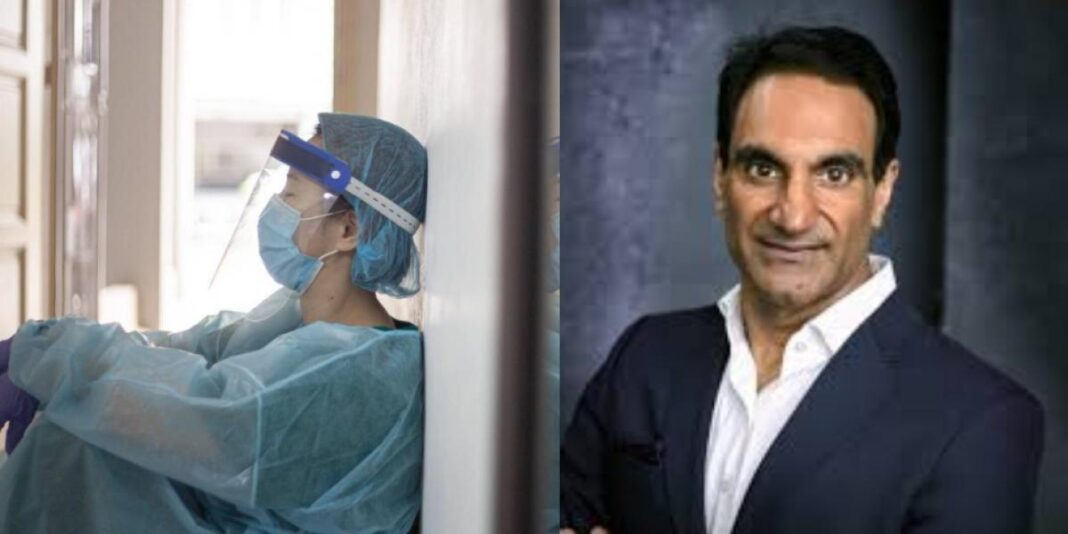New York, NY – In a world caught in the grip of a relentless virus, there stood a man many trusted, a man charged with safeguarding millions. But today, Jay Varma, once hailed as the steady hand behind New York City’s pandemic response, faces accusations that threaten to shatter that trust.
Jay Varma, the city’s leading public health advisor and the trusted “COVID czar,” helped shape the rules that kept a city of millions apart, safe in their homes, behind closed doors. He was the face of resilience, appearing daily alongside then-mayor Bill de Blasio, offering calm amid chaos. But like shadows cast by a flickering candle, secrets have a way of slipping through the cracks, even when they are tucked deep within the corners of power.
In the stillness of the city’s strictest lockdowns, as families mourned in isolation and frontline workers fought tirelessly to save lives, a different kind of gathering took place—far from the weary eyes of the public. A video, whispered through the back channels of the internet, has surfaced, pulling back the curtain on what appears to be a hidden life. Jay Varma is seen, not in a lab coat or behind a podium, but indulging in secret sexual parties during the height of the pandemic.
“I Had to Escape to Be Myself”
In an interview with an undercover journalist, Varma’s own words, captured in secret, paint a picture of contradiction. “I had to be a little sneaky about it,” he admitted, the gravity of his role as the architect of COVID protocols not lost on him. “I was in charge of the city’s response, but at night, I’d sneak away to gatherings where I could just… be me.”
The city he helped protect followed his lead, embracing rules that limited gatherings to no more than ten people. But Varma confessed to joining crowded hotel rooms, far exceeding that limit, reveling in spaces that flouted the very restrictions he had helped put in place. “Did it scare me? Did I feel ashamed?” he mused in the now-infamous video. “No. If anything, I felt alive, like I was owning my truth.”
The Weight of Hypocrisy
For many, this revelation stings deeply. Jay Varma, the man tasked with enforcing isolation, the man who asked so much of a weary city, was seemingly playing by different rules. And it is not just the gatherings themselves that leave a bitter taste, but the message they send. As families missed final goodbyes, and frontline workers risked everything, the idea that a leader could enjoy secret freedoms feels like a betrayal of the highest order.
Varma, in a swift response to the circulating video, claimed he had been lured into a trap set by an “extremist organization” bent on discrediting him. He insists the footage was heavily edited and stitched together to create a narrative that suits his accusers’ agenda. “The conversation, which was recorded without my knowledge, was taken out of context,” he said. “They spliced together moments from years ago, and made it look like this happened during the height of the pandemic.”
Yet, amid the denials, one truth remains: Varma does not refute his involvement in these gatherings. What lingers is a stark admission that, as a man charged with the health of millions, he sometimes failed to protect even his own.
The Fragile Balance of Leadership
Leadership is a heavy cloak to bear, especially in times of crisis. And perhaps, in those quiet moments, far away from the cameras and the weight of a city’s expectations, Jay Varma sought reprieve. But the balance between public duty and private desire is delicate, and the public has little patience for those who fail to maintain it.
As the city moves forward, grappling with this revelation, many wonder what this means for the integrity of public health officials, who are meant to serve as beacons in the storm. For Jay Varma, the man once trusted to keep the city safe, the road ahead will be a long one, and the shadows of this scandal may follow him for years to come.
Looking Beyond the Scandal
There are always lessons to be learned in the aftermath of such public reckonings. At its heart, this story forces us to ask deeper questions about the expectations we place on our leaders. Can we hold them to a standard of perfection, when they, too, are subject to the same flaws and desires that pull at every human soul? Or is the real betrayal not in their missteps, but in their failure to acknowledge them openly?
As the city rebuilds its trust in the systems that kept it afloat during its darkest hours, the legacy of Jay Varma will serve as a reminder—of both the power and the peril that comes with leading through crisis. Because while the virus may be invisible, the impact of our actions always leaves its mark.


